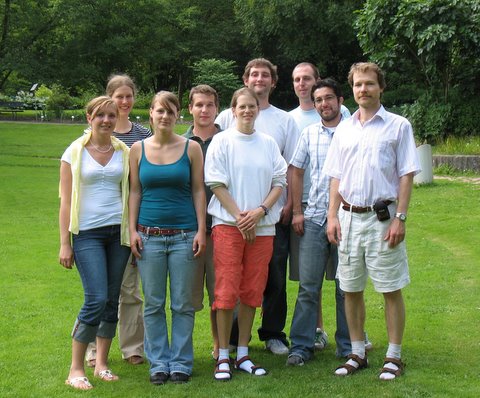Freiburg
From 2007.igem.org
(→Our Project:) |
|||
| Line 42: | Line 42: | ||
Our goal is to design integrated molecular sensing and executing devices based on modular protein engineering. These integrated devices can then easily be used for the construction of complex systems. We plan to fuse sensing proteins, which provide nano-mechanical movements upon an external signal, to executing proteins, which depend in their activity on the nano-mechanical movement of the sensing protein. To elucidate the possibilities of such a system we plan to fuse each of the termini of Calmodulin, which senses Ca2+, or the Maltodextrin Binding Protein, which senses maltodextrin, to one half of a split enzyme such as β-lactamase. We expect that we can design the separation of the two enzyme fragments by one conformation of the sensing protein such that there is no activity and that a conformational change in the sensor will bring the enzyme fragments together resulting in activity of the execution part. Once the basis of the interconnection of sensor and executor has been established, we plan to extend the work in a modular fashion to further proteins in order to generate a readily available and easy to tailor toolbox. We see application of such tools as varied as bacterial growth regulation and tumor targeting. | Our goal is to design integrated molecular sensing and executing devices based on modular protein engineering. These integrated devices can then easily be used for the construction of complex systems. We plan to fuse sensing proteins, which provide nano-mechanical movements upon an external signal, to executing proteins, which depend in their activity on the nano-mechanical movement of the sensing protein. To elucidate the possibilities of such a system we plan to fuse each of the termini of Calmodulin, which senses Ca2+, or the Maltodextrin Binding Protein, which senses maltodextrin, to one half of a split enzyme such as β-lactamase. We expect that we can design the separation of the two enzyme fragments by one conformation of the sensing protein such that there is no activity and that a conformational change in the sensor will bring the enzyme fragments together resulting in activity of the execution part. Once the basis of the interconnection of sensor and executor has been established, we plan to extend the work in a modular fashion to further proteins in order to generate a readily available and easy to tailor toolbox. We see application of such tools as varied as bacterial growth regulation and tumor targeting. | ||
| - | == | + | == Support: == |
[http://www.syntheticbiology.ethz.ch/synbiocomm/index SYNBIOCOMM] | [http://www.syntheticbiology.ethz.ch/synbiocomm/index SYNBIOCOMM] | ||
| Line 53: | Line 53: | ||
-@kristian: wie bezeichne ich die "synbiocomm" offiziell, und soll ich die verlinken (wenn ja, wohin?) konkrete Angaben zu erhaltenen Beträgen lass ich besser weg, oder? Bis dahin, Grüsse, Philipp | -@kristian: wie bezeichne ich die "synbiocomm" offiziell, und soll ich die verlinken (wenn ja, wohin?) konkrete Angaben zu erhaltenen Beträgen lass ich besser weg, oder? Bis dahin, Grüsse, Philipp | ||
| - | KM: Hallo Phillip, ein link zur uni-page kann man auch separat in einem kurzen Text unter die Namen setzen, Beiträge würde ich im Moment noch weg lassen, das | + | KM: Hallo Phillip, ein link zur uni-page kann man auch separat in einem kurzen Text unter die Namen setzen, Höhe finanzieller Beiträge würde ich im Moment noch weg lassen, das Projekt würde ich aus einem der Anträge kopieren (der Text ist eine Idee). Die Plazierung des Bildes mit Unterschrift kann zusammengezogen werden ev als Tabelle. |
Grüße Kristian | Grüße Kristian | ||
--> | --> | ||
Revision as of 21:03, 14 June 2007
Team Members:
Instructors:
Kristian M. Müller, Katja M.Arndt
Students:
Maximilian Mauler
Moritz Busacker
Corinna Gruber
Natalia Maier
Dario Hermida-Apontes
Philipp Mappes
Graduate Student:
Dinah Mattay
Advisors:
Michael Reth, Bodo Rak
Our Project:
Our goal is to design integrated molecular sensing and executing devices based on modular protein engineering. These integrated devices can then easily be used for the construction of complex systems. We plan to fuse sensing proteins, which provide nano-mechanical movements upon an external signal, to executing proteins, which depend in their activity on the nano-mechanical movement of the sensing protein. To elucidate the possibilities of such a system we plan to fuse each of the termini of Calmodulin, which senses Ca2+, or the Maltodextrin Binding Protein, which senses maltodextrin, to one half of a split enzyme such as β-lactamase. We expect that we can design the separation of the two enzyme fragments by one conformation of the sensing protein such that there is no activity and that a conformational change in the sensor will bring the enzyme fragments together resulting in activity of the execution part. Once the basis of the interconnection of sensor and executor has been established, we plan to extend the work in a modular fashion to further proteins in order to generate a readily available and easy to tailor toolbox. We see application of such tools as varied as bacterial growth regulation and tumor targeting.
Support:
[http://www.syntheticbiology.ethz.ch/synbiocomm/index SYNBIOCOMM]

